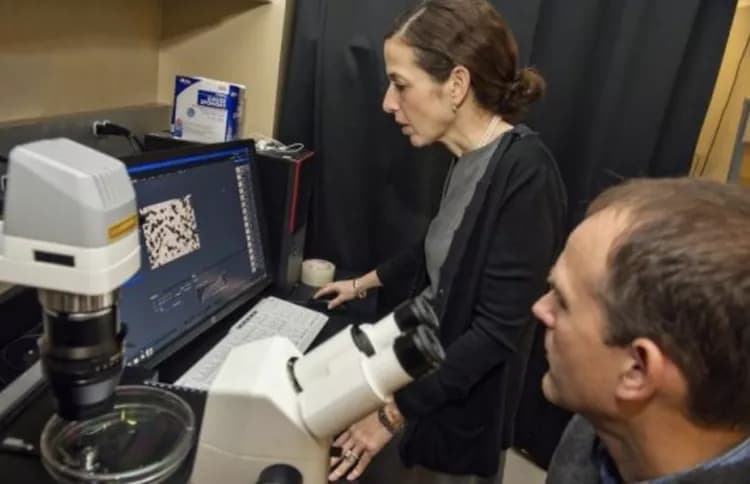
Drug Combo Gangs Up To Take On Triple-Negative Breast Cancer
In the hunt for novel treatments against an aggressive form of breast cancer, researchers combined a new protein inhibitor with a chemotherapy drug to create a powerful combination that resulted in cancer cell death.
Triple-negative breast cancer is a subtype that does not express hormone receptor or HER2. It occurs in approximately 15 percent of patients with breast cancer. This subtype tends to be more aggressive and targeted therapeutic treatment options are lacking.
In this work, the drugs studied were each tested separately in triple-negative breast cancer cell lines and in mice with the disease. The researchers then implemented the treatments in combination. The combination produced a synergistic effect that was more effective than either drug alone. The cancer cells treated with the drug combination were less likely to multiply or spread in cell culture and were less viable in an animal model.
Preliminary data had shown that inhibiting proteins called cyclin dependent kinases, or CDKs, might be effective against triple negative breast cancer. In this study, researchers tested a pharmaceutical grade CDK inhibitor called CYC065. Additionally, researchers used the chemotherapy drug eribulin, which had shown promise in prior clinical trials for the treatment of triple-negative breast cancer.
"In this pre-clinical study, we showed that the combination of CYC065 and eribulin had a synergistic effect against the growth and progression of triple-negative breast cancer. New therapeutic targets and treatment strategies are crucial to improve outcomes for women with this aggressive breast cancer subtype," says study author Jacqueline S. Jeruss, M.D., Ph.D., director of the Breast Care Center at the University of Michigan Comprehensive Cancer Center.
From the early days of her career, Jeruss was interested in how signaling pathway alterations could impact the development of breast cancer. What makes a mammary cell change to allow for lactation but then regress when that function is no longer needed? What orchestrates cell regulation to allow for such carefully mediated physiologic changes? And what processes occur over time that cause the cellular deregulation leading to cancer development in certain patients, but not in others?
Her work led her to the implementation of CDK inhibitors for the treatment of triple negative breast cancer. She found that these drugs could help to block the harmful impact of overexpression of cancer promoting cyclin E/CDKs, proteins that were inhibiting the tumor suppressant action of the TGF-beta/SMAD3 pathway. CDK inhibitors can block the impact of cyclin E/CDK action, helping to restore the beneficial effects of the TGF-beta/SMAD3 pathway, and thus facilitating cancer cell death.
In the current study, published in Oncotarget, the combination treatment of the CDK inhibitor CYC065 with the chemotherapy eribulin, resulted in less viable triple negative breast cancer cells, smaller tumor colonies, decreased cell migration, and small tumor size in an animal model.
Researchers also identified specific transcription factors that were impacted by CYC065. These processes likely work together to promote cancer cell death.
"We have begun to identify a network of vulnerable and targetable signaling components within the triple negative cancer cells that can be exploited with CDK inhibitor and chemotherapy treatment to promote triple negative breast cancer cell death," Jeruss says.
The research was done with triple negative breast cancer cells in culture and in an animal model. The next step is for researchers to develop a clinical trial to test the drug combination in patients with triple-negative breast cancer.
Materials provided by Michigan Medicine - University of Michigan. Note: Content may be edited for style and length.
Disclaimer: DoveMed is not responsible for the accuracy of the adapted version of news releases posted to DoveMed by contributing universities and institutions.
References:
Shreyas S. Rao, Jenna Stoehr, Danijela Dokic, Lei Wan, Joseph T. Decker, Kristine Konopka, Alexandra L. Thomas, Jia Wu, Virginia G. Kaklamani, Lonnie D. Shea, Jacqueline S. Jeruss. (2017). Synergistic effect of eribulin and CDK inhibition for the treatment of triple negative breast cancer. Oncotarget. DOI: 10.18632/oncotarget.20202
Related Articles
Test Your Knowledge
Asked by users
Related Centers
Related Specialties
Related Physicians
Related Procedures
Related Resources
Join DoveHubs
and connect with fellow professionals

0 Comments
Please log in to post a comment.